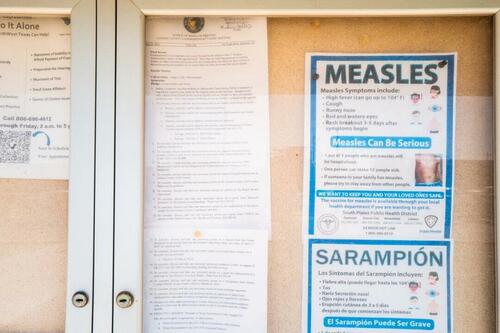
Measles Outbreak Likely Bigger Than Thought: CDC
Authored by Zachary Stieber via The Epoch Times (emphasis ours),
The measles outbreak that started in Texas this year is likely larger than reported, a U.S. Centers for Disease Control and Prevention official said on April 15.
 A measles advisory on a bulletin board outside the Gaines County Courthouse in Seminole, Texas, on April 9, 2025. Brandon Bell/Getty Images
A measles advisory on a bulletin board outside the Gaines County Courthouse in Seminole, Texas, on April 9, 2025. Brandon Bell/Getty Images“We do believe that there’s quite a large amount of cases that are not reported,” Dr. David Sugerman, a senior CDC scientist working on measles, said during a meeting with the agency’s vaccine advisory panel.
“In working very closely with our colleagues in Texas, in talking with families, they may mention prior cases that have recovered and never received testing, [and] other families that may have cases and never had sought treatment,” he said. “So we do think that there is under-testing and therefore under-diagnosis and under-reporting.”
The outbreak in Texas started in Gaines County in January and has since expanded to multiple other jurisdictions, including part of New Mexico.
As of April 15, Texas had confirmed 561 cases, and New Mexico had confirmed 63 cases.
Most patients are either unvaccinated or have no documented doses of a measles, mumps, rubella (MMR) vaccine more than 14 days before the onset of symptoms. Seventeen of the patients had received at least one MMR vaccine dose.
In Gaines County and surrounding areas, falling vaccination rates have been recorded for years. Federal and local health officials say 95 percent coverage is needed for herd immunity, or community protection. But just 82 percent of kindergartners and 90 percent of seventh graders in Gaines County had received two doses, or a full series, of the vaccine, according to the most recent data available, from 2023 to 2024.
Underreporting cases of measles “is not uncommon in close-knit communities that may also have lower health care seeking behavior at baseline,” Sugarman said on April 15.
Two people have died from measles in Texas, according to state health officials. Dr. Edwin Jose Asturias, a panel member, said that factoring in the reported number of cases, the case fatality rate would be much higher than is historically known for measles outbreaks.
“I don’t want to think that there is a higher mortality there. Perhaps what’s happening is a huge amount of under-reporting of the cases of measles that are happening in that jurisdiction,” he said.
Sugarman reported to the committee that as of April 10, there had been 712 confirmed cases of measles across 25 states in 2025—up from 285 cases in all of 2024—with most of the cases being part of one of five ongoing outbreaks.
Measles spreads through respiratory droplets and airborne transmission. It causes symptoms such as rash and fever.
Health Secretary Robert F. Kennedy Jr. said at an unrelated press conference earlier on April 15 that some people get measles “because they don’t vaccinate” and that people who are vaccinated contract the disease “because the vaccine wanes about 4.8 percent per year.”
A 2023 paper published by the American Journal of Epidemiology that studied antibody levels found that the antibodies waned by 4.8 percent a year among those who received two doses of the MMR vaccine, compared with 9.7 percent per year after one dose.
“It’s a leaky vaccine, and that problem is always going to be around,” said Kennedy, who recently advised people to take the MMR shot.
Some other studies, such as a 2023 study from France, have concluded that the protection from the vaccine drops only slightly over time.
Dr. Helen Keipp Talbot, a professor of medicine at Vanderbilt University who chairs the CDC’s vaccine advisory panel, said during the April 15 meeting that “there’s no reason why we have healthy children dying of measles in the U.S. when this vaccine is amazing.”
“It’s highly effective and has a very long-lasting immunity,” she said.
Kennedy said recently that Americans who have died with measles have underlying conditions. One of the children who died this year, he said, had lingering mononucleosis, citing her medical records and his conversations with her parents.
Texas officials have said one of the girls who died this year had no underlying conditions and that neither child had been vaccinated.
The CDC’s childhood vaccination schedule recommends that the first dose of the MMR vaccine be administered at about 12 months of age, with a second dose several years later. Many school districts mandate two doses of the vaccine.
The CDC says on its website that one dose of the MMR vaccine is 93 percent effective against measles, while two doses are 97 percent effective. The estimates come from a 2013 paper analyzing studies that were performed more than a decade ago, according to a spokesperson for the agency.
“Although the titer of vaccine-induced antibodies is lower than that following natural disease, both serologic and epidemiologic evidence indicate that vaccine-induced immunity appears to be long-term and probably lifelong in most persons,” the CDC site says. “Most vaccinated persons who appear to lose antibody show an anamnestic immune response upon revaccination, indicating that they are probably still immune.”
A 2021 paper found that some people who received a measles vaccine had no detectable immunoglobulin G antibodies against measles.
Tyler Durden
Thu, 04/17/2025 – 11:05

 4 miesięcy temu
4 miesięcy temu












